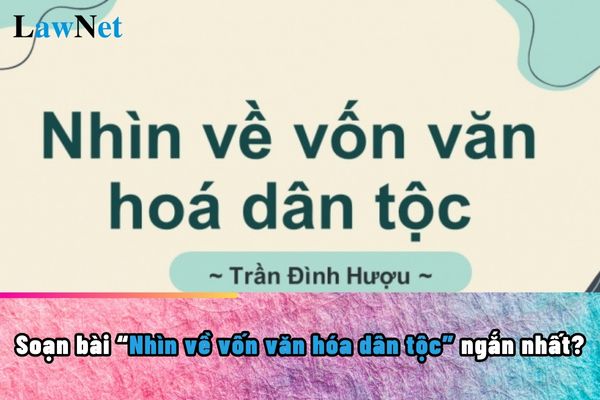What are guidelines on preparing the lesson "Nhìn về vốn văn hóa dân tộc" for students in Vietnam? What are rights of grade 12 students in Vietnam?
What are guidelines on preparing the lesson "Nhìn về vốn văn hóa dân tộc" for students in Vietnam?
"Nhìn về vốn văn hóa dân tộc" is one of the texts that students will study in the grade 12 Vietnamese Literature curriculum.
Here is a sample for preparing the lesson plan on "Nhìn về vốn văn hóa dân tộc".
|
Prepare the Lesson Plan on "Nhìn về vốn văn hóa dân tộc" Analyze the excerpt "Nhìn về vốn văn hóa dân tộc" by Trần Đình Hượu |
Note: Information is for reference only./.

What are guidelines on preparing the lesson "Nhìn về vốn văn hóa dân tộc" for students in Vietnam? What are rights of grade 12 students in Vietnam? (Image from the Internet)
What are rights of grade 12 students in Vietnam?
Article 35 of the Regulations for lower secondary schools, upper secondary schools, and schools with multiple levels, issued with Circular 32/2020/TT-BGDDT, outlines the following rights for grade 12 students:
- Equal access to comprehensive education, guaranteed conditions of time, facilities, hygiene, and safety for studying in class and self-study at home; provision of information regarding their studies and training, use of equipment and facilities for educational, cultural, and sports activities as per school regulations.
- To be respected and protected, treated equally, and democratically, with the right to appeal to the school and educational management authorities concerning decisions affecting them; right to transfer schools for legitimate reasons as per current regulations; and right to advance grades, or study above the stipulated age according to Article 33 of the Regulations (issued with Circular 32/2020/TT-BGDDT).
- Participation in activities to develop talents in various subjects, sports, and arts organized by the school if eligible.
- Receipt of scholarships or other allowances as per regulations for socially privileged students, those facing life difficulties, and students with exceptional abilities.
- School transfer if eligible under regulations; procedures to be conducted as per the Minister of Education and Training's instructions.
- Enjoyment of other rights as stipulated by law.
What will grade 12 students in Vietnam study in the Literature subject?
According to subsection 2, Section 5 of the General Education Program for Literature subject issued with Circular 32/2018/TT-BGDDT, grade 12 students will study the following content in Literature:
*VIETNAMESE LANGUAGE KNOWLEDGE
- Preservation and development of the Vietnamese language
- Logical errors, ambiguous sentence errors, and corrections
- Sarcasm and paradox rhetorical devices: characteristics and effects
- Text type and genre
+ Argumentative texts: the role of arguments, reasoning, evidence; purpose, sentiment, and viewpoint of the writer; methods to enhance affirmation and negation in argumentative texts;
Argumentative methods and expressive language; speeches during the launch of movements or social activities; argumentative essays on issues related to youths; comparative and evaluative essays on two literary works of the same or different genres
+ Informative texts: the value of the topic, main information of the text; types of data and data reliability; work-related correspondence; report results of project tasks or research on a natural or social issue
- Respect and protection of intellectual property rights in learning and research
- Basic characteristics of formal and informal language: understanding and application
- Non-verbal communication tools: images, statistics, diagrams, charts,...
*LITERATURE KNOWLEDGE
- Cognitive, educational, and aesthetic functions of literature
- The alignment of theme, ideology, and primary emotion
- Some expressions of artistic style in folk literature, medieval literature, modern literature, realism, and romanticism movements; the artistic style of the author
- Certain elements of legendary stories, novels (modern and post-modern), modern lyric poetry, comedy, and memoirs
+ Legendary stories: theme, character, language, artistic techniques; evaluate the role of the fantastic element in legendary stories, relate to its role in folk tales
+ Novels (modern and post-modern): language, psychological development, character actions
+ Modern lyric poetry: language, imagery, symbols, symbolic and surreal elements
+ Comedy: language, character, situations, satirical techniques
+ Reportage, diaries, or memoirs: non-fiction character, description, narration; combination of details, real events with the writer’s experiences, attitudes, and evaluations
- Psychological development of characters and methods of expressing character psychology by the writer
- Relationship between narrator, viewpoint in expressing the text’s theme
- Basic knowledge of Ho Chi Minh to aid in understanding some of his notable works
- An overview of literary history and the role of foundational literary history knowledge in understanding texts.

